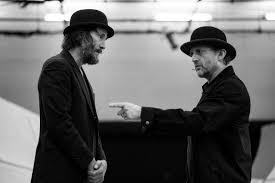
Star billing does a lot for a play. As Exhibit A, I give you Samuel Beckett’s play Waiting for Godot, which is enjoying a renaissance on Broadway thanks to the star power of Bill and Ted (a.k.a. Keanu Reeves and Alex Winter). It’s a play about nothing, in a way. Two characters, Vladimir and Estragon, wait for someone named Godot (note the Cracker Jacks-like surprise inside, the word “God”), only instead of someone they get no one. Just a lot of waiting. And talking. Thus a play about waiting. And talking.
Circles, anyone? And why does the plot of Waiting for Godot remind me of the life of a poet? Let me make like Barrett Browning and count the ways.
Poets do a lot of waiting. First and foremost, for the inspiration of ideas. Second, for the “time” to write (or so they say, as they check their cell phone and social media for the umpteenth time in the past ten minutes). And third, for the discipline to write and then revise (wait for it) over and over and over and over and over again.
All of this waiting allows the poet to play Vladimir or Estragon all he wants. In lines and stanzas, if he wishes. In a sonnet, if he’s playful. Haiku will even do, if he’s waiting in his briefs.
Then comes more waiting. After due diligence the poems (usually in sets of five, and usually in exchange for a $3 reading fee to keep a poetry journal afloat) are turned loose on a small isle in the reading world. An isle called Random Poetry Journal.
Response time? Surely Godot will know! If it says three months, figure six or more. If it says six, figure a year or more. If it says nine (It’s a boy! No, it’s a girl!), you may never hear back, a result Beckett would fully understand.
Poets may keep records all they want, but they should keep a duster, too, so they can feather off the dates and scratch their waiting heads.
There are other ways poets know Godot, I fear. Sometimes they share their poetry with established poets for criticism. Sometimes these poems are yet unpublished, other times not only published but in book form.
Nevertheless, engaging in such foolishness—especially with a poet who is more “established” and thus in a class or two above you in Poetry World’s caste system-like pecking order—is just asking for more of the Godot treatment. Surely Vladimir and Estragon were familiar with the sound of crickets!
Such is the way of the world, friends. Which means? Beckett nailed it, and I’d love to see the current revival of his play some day. When I do, I’ll go into full solipsist mode, thinking, “Hey! It’s true! This is a play about me!”
Then I’ll look in the poetry mirror. And hear Godot humming “I Still Haven’t Found What I’m Looking For.”
